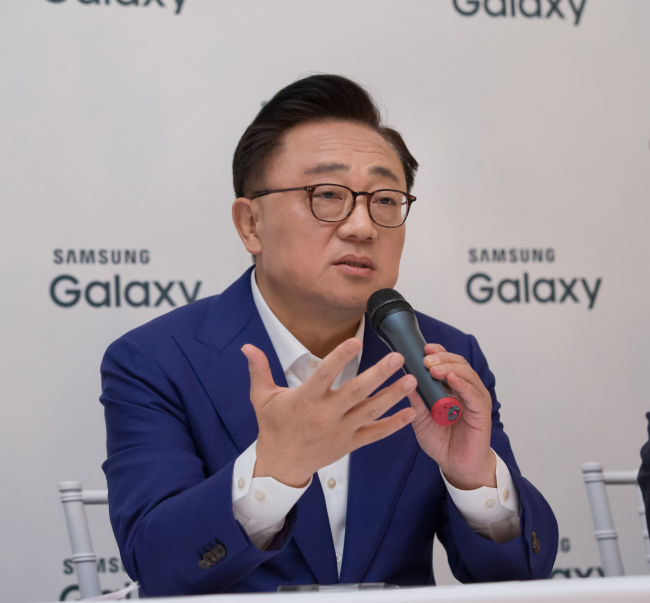Samsung
[MWC 2018] Samsung to shift focus after Galaxy S9 series
[THE INVESTOR] BARCELONA, Spain -- Samsung Electronics announced a strategic shift in focus at the Mobile World Congress currently underway in Barcelona, Spain, on Feb. 26 (local time), saying it aims to be more committed to developing new meaningful products, rather than being the first in everything.
Speaking at a press conference with Korean reporters after the Galaxy S9 Unpacked event, Koh Dong-jin, head of Samsung Electronics’ mobile business, noted that the tech giant had so far been obsessed with being the first to roll out new technology, but that will change now.
 |
Samsung Electronics Koh Dong-jin speaks during a press conference in Barcelona, Spain, on Feb. 26. (Samsung Electronics) |
RELATED:
[MWC 2018] Samsung CEO highlights Galaxy camera features
[MWC 2018] Samsung may scrap numeric naming for next Galaxy lineup
“We developed mobile phones earlier than Chinese firms, and we were obsessed with being the world’s first and industry’s first, rather than thinking about how this innovation could be meaningful to consumers,” Koh said. “Being the first is no longer important today, and our strategy is to launch something that consumers believe is meaningful and valuable at the right time.”
The CEO was responding to questions on the company’s roadmap for hardware innovation amid comparison with Samsung’s Chinese rivals in the fields of in-display fingerprint sensors and foldable displays. Koh confirmed that Samsung would launch phones with such technologies when it is fully ready.
Koh had said at the Galaxy Note 8 launch even last year that foldable smartphones would be launched in 2018. However, the tech giant is reportedly facing technological difficulties for commercializing them.
So instead of foldable phones, Samsung will introduce its first artificial intelligence-based speaker in the second half of the year, he said.
“Again, with the AI speaker, we will launch it when it’s ready with top-notch quality, because we are a newcomer in the market,” he said.
Samsung has been working on the product with its affiliate Harman International Industries, which it acquired last year.
“Samsung’s AI speaker will be more than speaking to a machine and listening to music,” Koh said. “The speaker will not be a single hub, but be one of the many platforms such as TV, refrigerator and other appliances that form a true Internet of Things environment.”
The upgraded version of its assistant Bixby 2.0, meanwhile, will be launched on the Galaxy Note 9 this summer, he disclosed.
“Bixby 1.0 was short of expectations as we were in a hurry, because the software had a structure that made it difficult to expand its ecosystem,” Koh said. “Up until the launch, Bixby 2.0 will need extensive beta tests.”
Samsung is conducting beta tests with around 800 outside developers to help create an open ecosystem for Bixby.
In order to prepare for the fifth-generation network and smartphones, Samsung’s IT & mobile communications business under Koh has renewed the organization’s business direction toward the 5G system, according to the mobile chief.
“I announced a month ago about the shift from 4G to 5G,” he said. “Samsung is thoroughly preparing for 5G in close cooperation with mobile operators.”
Samsung is known to be closely partnering with Korea’s leading mobile carrier SK Telecom to develop the 5G core network equipment, chipsets and smartphones.
By Song Su-hyun / Korea Herald (song@heraldcorp.com)






![[From the Scene] Gigantic Olive Young store lures young trend-setters in Seongsu](http://res.heraldm.com/phpwas/restmb_idxmake.php?idx=151&simg=/content/image/2024/11/21/20241121050065_0.jpg)

